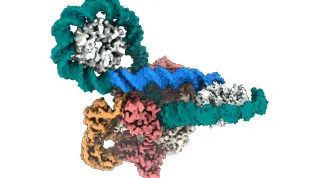
There are five scenarios concerning the development of COVID-19 which we should prepare for in 2021 and ahead, say scientists from the President of the Polish Academy of Sciences.
The first of the scenarios in the report assumes that the National COVID-19 Immunization Scheme will be successful in 2021.
In this scenario, a large section of the population will be vaccinated against COVID-19 and thereby herd immunity will be achieved. This scenario assumes that administrative restrictions as well as uncertainty and fear limiting the activity of citizens will gradually decrease. The Polish economy will slowly start to wake up and return to activity. In this optimistic scenario, at the turn of and in 2022, cases of COVID-19 will be sporadic, thanks to which we will be able to freely travel to countries that will control the COVID-19 epidemic.
According to the second scenario, the National COVID-19 Immunization Scheme will not be successfully implemented in 2021.
This can happen if there are too many people who do not want to be vaccinated. This scenario assumes that the epidemic in Poland will still continue (perhaps with a slightly lower intensity in the summer months and higher in the fall and winter months). Travel to and from Poland will be temporarily limited or suspended. Experts expect that in this situation, as a result of the stress associated with a prolonged pandemic, we will observe an increase in clinical symptoms of phobias, social anxiety, depression, psychotic disorders and other mental diseases. The rate of suicide, self-harm and other harmful behaviours (alcohol and drug abuse, aggression, violence) will increase. In this scenario, the economy will remain stagnant as the government will be forced to introduce temporary restrictions.
Scenario 3 assumes that immunity to COVID-19, which we will acquire as a result of vaccination in 2021, will wear off after a short time.
In this scenario, the majority of people in Poland will be vaccinated in 2021. While this will initially reduce the incidence of COVID-19, the immunity will begin to decrease over time. The number of COVID-19 patients will therefore go up again. According to the experts, we should then carefully monitor the situation and systematically test random groups representative of the population. We should also implement a control test strategy (at least 300 tests per million people per day). In this situation, measures to reduce the epidemic must be promoted, such as wearing face masks, adherence to hygiene rules and social distancing. Local outbreaks must be quickly extinguished, for example by means of restrictions. The booster vaccination program will have to be started.
According to the fourth scenario, vaccine-resistant variants of the SARS-CoV-2 virus will emerge in 2021.
Thanks to monitoring, new variants should be spotted early and new methodology used to quickly create and modify the vaccine depending on the new virus mutations. “In addition, we can expect that over time the virus itself will also shift towards lower virulence to eventually become a relatively harmless pathogen, similar to seasonal coronaviruses,” the team members say.
The last scenario predicts that we will be attacked by a completely new pathogen in the coming years.
According to the scientists: “We do not know all viruses that pose danger to humans, many diseases have yet to appear, and many others are dormant. If another new disease emerges before the COVID-19 epidemic is suppressed, we will have to fight on two fronts, against two completely different pathogens.
“In order to emerge victorious from the future pandemics, the Polish economy needs two large investments: in health care and anti-epidemic protection.”
The members of the interdisciplinary advisory COVID-19 Team are Professor Jerzy Duszyński, Professor Krzysztof Pyrć, Dr. Anna Plater-Zyberk, Dr. Aneta Afelt, Professor Małgorzata Kossowska, Professor Radosław Owczuk, Dr. Anna Ochab-Marcinek, Dr. Wojciech Paczos, Dr. Magdalena Rosińska, Professor Andrzej Rychard and Dr. Tomasz Smiatacz. (PAP)
Author: Ludwika Tomala
lt/ agt/ kap/
tr. RL












